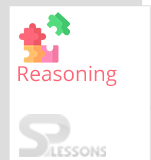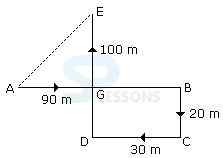 Introduction
Introduction
SBI PO 2019 - Main Examination, Objective Tests conducted in online Mode, has: a duration of 3 hours, 4 Sections, a total of 155 questions, a Maximum score of 200 marks, and, is followed by a Descriptive Test (English language) for a duration of 30 minutes. The 4 Sections are timed: Reasoning & Computer Aptitude, Data Analysis & Interpretation, General/ Economy/ Banking Awareness and English language. The section wise details are as shown below.
The Objective Tests are followed by a Descriptive Paper (Letter Writing + Essay Writing). There is a Negative marking in SBI PO Reasoning and Computer Aptitude Main exam and 0.25 marks are deducted for each wrong answer. Candidates must clear the cut-off in all the sections to qualify for the Group Exercises & Interview.
 Pattern
Pattern
| S.No. | Name of Test | Number of Questions | Mark | Duration |
|---|---|---|---|---|
| 1 | Reasoning & Computer Aptitude | 45 | Total Max. Marks 200 | 60 minutes |
| 2 | Data Analysis & Interpretation | 35 | 45 minutes | |
| 3 | General/Economy/Banking Awareness | 40 | 35 minutes | |
| 4 | English Language | 35 | 40 minutes | |
| Total | 155 | 3 Hours |
 Quiz
Quiz
Directions(1-5): Study the following information carefully and answer the given questions.
Ten Sports personalities are sitting in two parallel rows of six seats each. One seat is vacant in each row. Geeta Phogat,Sushil Kumar, Ravichandran Ashwin, Vijender Singh and Sania Mirza are sitting in row-1 facing South. Sachin, M.S.Dhoni, P.V.Sindhu, Deepa Karmakar and Sakshi Malik are facing North. Each likes a different brand of laptops i.e. Lenovo, HP, Dell, Acer, Samsung, Apple, Sony, Asus, Toshiba and HCL.
DeepaKarmakar sits third to the right of P.V.Sindhu and likes Acer. Only two people sit between M.S.Dhoni and the vacant seat. M.S.Dhoni does not like Samsung or Dell laptop. Sania Mirza is not an immediate neighbour of Ravichandran Ashwin. Sushil Kumar likes HCL. The one who likes Dell laptop faces the one who likes Asus. The one who likes Dell sits opposite to the one who sits third right of the person who sits opposite to Deepa Karmakar. Ravichandran Ashwin is not an immediate neighbour of Vijender Singh. Sakshi Malik, who likes neither Samsung nor Apple, does not face the vacant seat. Neither Deepa Karmakar nor P.V.Sindhu sits at any of the extreme ends of the row. Vijender Singh faces P.V.Sindhu. Vacant seats are not opposite to each other. Two seats are there between Ravichandran Ashwin and Sushil Kumar, who sits third right of the one who likes Sony. The one who likes Toshiba laptop faces the one who likes Acer. The persons who like the Lenovo and Asus are adjacent to each other. Vacant seat of row – 1 is not an immediate neighbour of VijenderSingh .M.S.Dhoni sits at one of the extreme ends of the row. P.V.Sindhu does not like Lenovo and Asus. Vacant seat of row-1 does not face Deepa Karmakar who doesn’t sit at any of the extreme ends of the row.
1. Who among the following likes Apple?
- A. Sakshi
B. Deepa Karmakar
C. M.S.Dhoni
D. Vijender Singh
- A. Saniya Mirza, HCL
B. Dell, Sachin
C. Samsung, M.S.Dhoni
D. Sakshi, Acer
- A. One
B. Two
C. Three
D. Four
- A. Vijender – HCL
B. P.V.Sindhu – Acer
C. Sakshi – Sony
D. Sachin – Samsung
- A. HCL
B. Acer
C. Sony
D. HP
Directions(1-2): Read the following information and answer the following question.
A – B means A is wife of B
A ÷ B means A is mother of Q
A + B means A is son of Q
A × B means A is brother of Q
1. What does X+Y-Z mean ?
- A. Z is the father of X
B. Z is the son of X
C. Z is the uncle of X
D. Z is the brother of X
- A. P is the brother of Q
B. P is the father of Q
C. P is the uncle of Q
D. P is the sister of Q
- A. JUXHN
B. JUYHN
C. JUYHM
D. JUYEM
- A. PDJEHO
B. PDEJHO
C. PDFEHO
D. PDFDHO
- A. None
B. One
C. Two
D. Three
1. Statement:
Is learning a continuous process?
Arguments:
I. Yes, there is so much to learn and we have so little time.
II. No, learning stops after one has obtained the highest degrees in their subject.
- A. If only argument I is strong
B. If only argument II is strong
C. If neither argument I nor II is strong
D. If both arguments I and II are strong
- A. If only argument I is strong
B. If only argument II is strong
C. If neither argument I nor II is strong
D. If both arguments I and II are strong
- A. 80 m
B. 100 m
C. 140 m
D. 260 m
- A. If only assumption I is implicit.
B. If only assumption II is implicit.
C. If either I or II is implicit.
D. If neither I nor II is implicit.
- A. If only assumption I is implicit.
B. If only assumption II is implicit
C. If either I or II is implicit.
D. If neither I nor II is implicit.
Other Articles
 Study Guide
Study Guide
 Exams
Exams
| Competitive Exams - College Entrance Exams | |||
|---|---|---|---|
| Category | Notification | ||
| Diploma | NITC New Delhi | Goa Diploma Admissions 2019 | |
| Click Here For – All India Entrance Exam Notifications | |||
 Daily CA
Daily CA
 Job-Alerts
Job-Alerts
 SP Quiz
SP Quiz
| Competitive Exams - Practice Sets | |
|---|---|
| Category | Quiz |
| Quant Aptitude | Permutation and Combination |
| Reasoning Ability | Direction Sense |
| Insurance Awareness | Insurance Awareness |
 GK
GK
| General Knowledge for Competitive Examinations | |
|---|---|
| Topic | Name of the Article |
| GK - World | World Major Airlines |
| Oscar Awards 2019 | |
| Different Countries Republic Days | |
| GK - India | Indian Political Parties |
| Indian Airports | |
| Karnataka Khadi Granodyoga Samyukta Sangha | |
| GK - Abbreviations | Indian Railways Acronyms |
| International Organizations Abbreviations | |
| GK - Banking & Insurance | Indian Banking History Highlights |
| Indian Union Budget | |
| GK - Science & Technology | Scientific Laws and Theories |
| IBM IIT Bombay AI Research | |
| Indian Space Centers | |





